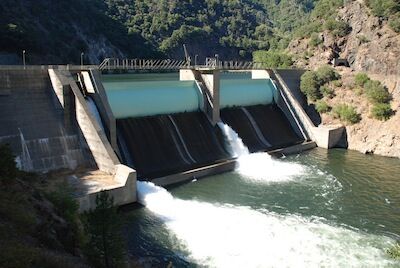
New Hydropower Legislation; A Bad Deal For Rivers
The recently introduced "Hydropower Clean Energy Future Act" by Rep. Cathy McMorris-Rodgers (R-WA) represents a short-sighted effort that would roll back critical river and clean water protections, cut the public out of decision-making in hydropower licensing, and put whitewater rivers at risk.
Hydropower has caused immeasurable harm to our nation's rivers over the past century. American Whitewater has worked to improve river health and enhance opportunities for the public to enjoy rivers impacted by hydropower. In cases where hydropower dams have an environmental impact greater than the value of continued operation, we have worked to remove them. This legislation would undermine our ability to successfully restore river health and opportunities for whitewater recreation. It is counterproductive to finding collaborative solutions that meet our nation's energy needs in a manner that adequately considers environmental impacts of hydropower. We stand ready to work together with the hydropower industry but this legislation represents the wrong approach.
While proponents in the hydropower industry have promoted the legislation as "regulatory reform," the health of our rivers would suffer. Key concerns with the legislation include:
- Tightly limits resource agency authority preventing consideration of cumulative impacts and mitigation measures that would enhance river health.
- Limits participation of the public and organizations like American Whitewater as well as states and tribes in hydropower licensing by shortening timelines, eliminating meetings, and reducing opportunities for effective mitigation measures that address project impacts.
- Gives the Federal Energy Regulatory Commission the ability to decide whether species or critical habitat will be jeopardized by a hydropower project. This is a determination currently made by resource agencies that administer the Endangered Species Act.
- Puts Federal Energy Regulatory Commission in charge of setting artificial timelines for other agencies that don't meaningfully take the agency processes and requirements into account. The timelines set in the bill aren't clear and are dangerously open to interpretation.
- Instead of focusing on the need to provide resource agencies with the information they need in a timely fashion, the legislation would fine agencies $5000 per project per week if they don't meet the deadlines set by the Federal Energy Regulatory Commission.
- Politicizes the licensing process referring disrupted matters to the President as the final arbiter in dispute resolution.
American Whitewater has had productive conversations with members of the hydropower industry on shared opportunities to improve the hydropower licensing process. By working together, we believe this can be done in a manner that provides more certainty for hydropower operators, increases the pace of restoring flows and implementing other restoration measures, and benefits river health. We are disappointed that some members of the industry and their friends in Congress are continuing the approach of eliminating necessary environmental review and diminishing the role of science. We can do better.
American Whitewater has proposed the following measures that would improve hydropower licensing, provide more certainty for operators, and enhance river health:
- Provide resource agencies with the information they need early in the hydropower licensing process and require hydropower projects to meet state water quality standards.
- Reduce economic and regulatory uncertainty and liability for the hydropower license surrender and decommissioning process. Hydropower projects have a finite lifespan, and many project across the Country have reached the end of their useful life. Hydropower operators and advocates working to restore rivers need more certainty for disposal of projects that are no longer economically viable.
- Urge policymakers involved in electricity markets to appropriately measure value, and compensate hydropower projects that provide flexibility and reliability services in order to meet both clean energy and environmental performance goals.
